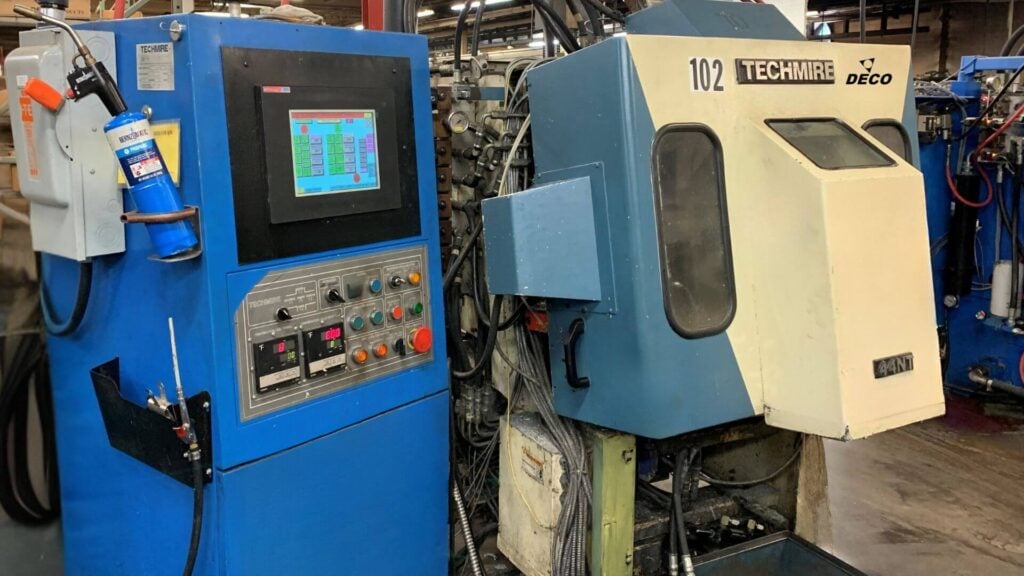Deco Products offers a range of manufacturing processes to meet diverse customer needs. For most of our history, we have focused on conventional hot chamber die casting. Our capabilities expanded in 2021 with the acquisition of Mumford Metal Casting of South Carolina. This acquisition expanded our machine inventory to include multi-slide diecast machines, also known as 4-slide machines.
Multi-slide die casting delivers efficient production for small net shape parts with difficult geometries, with very fast cycle times. This additional capability has better allowed us to offer a full range of solutions to our customers and better cover the entire range of customer needs.
What is Multi-Slide Die Casting?
The Conventional die casting process uses dies that split into two halves to produce parts. While there is significant design flexibility in conventional diecasting, there are limitations to the shapes that can be made by a conventional tool. Most conventional die casting shops can work around these limitations by adding additional machining operations to add unique features that cannot be formed by the die in the casting operation.
Conventional die casting is well-suited for larger tools, either because the part is large or because the mold has many cavities. Larger machines can squeeze harder on a tool to keep it closed as a large volume of zinc is injected under high pressure. Hence, only having two halves of the mold (one seam connecting the two sides) is helpful to be able to effectively squeeze the tool shut.
Conventional dies come in all kinds of sizes. At Deco, our conventional tools range from as little as 6 inches by 6 inches up to large as several feet in length. This allows us to form parts that weigh up to 6 pounds per part.
The Multi-slide die casting process uses dies that can split into more than two pieces to produce parts. Most commonly, we see tools split into 4 pieces, hence why this is commonly called “4-slide”. Deco’s multi-slide die casting machines frequently feature four perpendicular slides that close to form a mold cavity.
This allows us to form shapes that are much more difficult to produce in a conventional machine setup. This is especially true for fine details, tighter tolerances, undercuts, or features that are feasible but much more expensive to design into a conventional casting.
Commonly, multi-slide die castings have very few cavities, as the use of multiple slides makes it more difficult to plan multiple cavities. The molds also tend to be much smaller. At Deco, we commonly work with tools that are 2 to 6 inches in length and width. Sometimes, multi-slide is referred to as “miniature” casting, as tools and parts are so small compared to conventional castings.
Thanks to the small size, these machines cycle extremely fast. The machines are smaller, more energy efficient, and tend to be very economical. These small dies also end up with much smaller runners thanks to the small die size (Runners are where the molten metal is injected into the part cavity). This leaves less metal to be recycled per part produced, resulting in a more sustainable and cheaper recycling process.
Six Key Advantages of Miniature Die Casting
In summary, there are several reasons one of our Engineers may suggest a Multi-slide die casting tool for your next project:
- Complex Parts – The greatest benefit of a multi-slide machine is the ability to produce more complex and tighter tolerance parts
- Operational Efficiency – The typical multi-slide die casting offers fewer secondary operations than conventional die casting, helping reduce processing costs.
- Eliminates Trim Die – Multi-slide die casting often eliminates the need for trim dies. This streamlines workflows, reduces tool wear, and reduces the number of capital investments necessary to begin production.
- High Speed Production – Multi-slide machines typically function at a higher rate than conventional die cast machines.
- Part-to-Part Consistency – Multi-slide machines typically have fewer cavities than conventional machines, reducing potential part-to-part variation.
- Precise Production – These machines are typically better at producing small, complex parts thanks to the multi-slide function.

Optimizing Your Miniature Die Casting Projects with Zinc
Our design engineers evaluate the ideal manufacturing process for your custom die cast part on every project. We use our expertise to review your design, discuss potential changes, and help you get your next project into the right machine.

